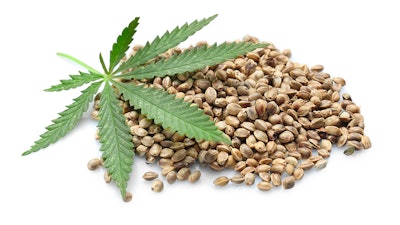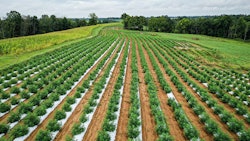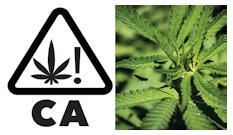
Editor’s note: This is a developing story.
Updated, 11 a.m., May 24, to include additional information re: other hemp changes in the Farm Bill, and 1:06 p.m. to include statement from Rep. Mary Miller
Update, 6:36 p.m.: The proposed amendment has been added to the 2024 Farm Bill draft, first reported by Marijuana Moment. "Members adopted the cannabinoid ban amendment from Rep. Mary Miller (R-IL) as part of an en bloc package with other unrelated changes in voice vote," the media outlet reported.
"There was no roll call vote on the hemp-killing Mary Miller Amendment ...," the U.S. Hemp Roundtable (USHR) stated in an eblast. "Instead, House Agriculture Committee Chairman G.T. Thompson grouped it 'en bloc with several other amendments and subjected them to a voice vote, which passed. This is especially disappointing because we were confident that on a roll call vote, we would win. In the 12 hours since we started our campaign, Hemp Supporters sent more than 7000 emails urging defeat of the amendment. Three Members of Congress spoke up at the hearing denouncing the amendment. But unfortunately, the decision was made by the Chairman to use a procedural tactic to avoid a separate vote on the issue. And that resulted in passage of a deeply flawed and deeply objectionable policy. Although we lost today’s battle, the war is far from over. The Farm Bill will be sent to the floor of the House where its passage this year seems unlikely. Even if the House should pass the Farm Bill, the differences between House Republicans and Senate Democrats are considerable at this point. And even if the major issues dividing the parties are resolved, we continue to have many friends in both branches on both sides of the aisle who will work with us to defeat this hemp-killing language."
The USHR is "asking all Representatives to vote against the Farm Bill unless the Mary Miller Amendment is removed," and encouraging its members to contact their members of Congress to "urge him or her to be prepared to vote against the Farm Bill unless the hemp industry-killing language is stripped out of the final draft."
"Just moments ago, the House Committee on Agriculture approved an amendment to the Farm Bill that would prohibit the manufacture and sale of products containing intoxicating levels of THC," stated National Cannabis Industry Association (NCIA) CEO and co-founder Aaron Smith in a mass email. He stressed the need for "Sensible federal regulations that apply equally to hemp- and marijuana- derived cannabinoid products," and provided a link to the NCIA's position paper, "Navigating the Future of Cannabinoid Regulation: Balancing Safety, Innovation, and Consumer Access."
Rep. Mary Miller said in a press release, “I am ... proud my amendment was included to close the loophole that has allowed drug-infused THC products like Delta-8 to be sold to teenagers in packaging that looks like candy. We must stop teenagers and children from being exposed to addictive and harmful drugs."
End update
A proposed amendment to redefine hemp in the 2024 Farm Bill would effectively make the intoxicating hemp-derived cannabinoid market illegal. It also would hinder seed companies, breeders and cannabis flower producers from selling seeds and cannabis flower across state lines in the U.S. under what is considered a loophole in the 2018 Farm Bill.
The amendment, offered by Rep. Mary Miller, R-Ill., proposes to change “the definition of hemp in the Agricultural Marketing Act of 1946 to only include naturally occurring naturally derived, and nonintoxicating cannabinoids.”
Miller’s proposed definition of hemp would include only components of the Cannabis sativa L. plant and all derivatives and seeds that include less than 0.3% total THC (including THCA) on a dry-weight basis. This would effectively make illegal products containing intoxicating hemp-derived cannabinoids (e.g., delta-8 THC), shuttering what has become a multibillion-dollar market in the U.S.
RELATED: How Do US Hemp-Derived Cannabinoid Sales and Craft Beer Sales Compare?
The draft of the 2024 Farm Bill (official name: The Farm, Food, and National Security Act of 2024) and proposed amendments are being reviewed by the House Agriculture Committee in a markup hearing May 23.
“The U.S. Hemp Roundtable [USHR], and the dozens of other nonprofit organizations in the hemp space, strongly oppose the Mary Miller amendment and urge its defeat in [the May 23] Farm Bill markup before the House Agriculture Committee,” said U.S. Hemp Roundtable General Counsel Jonathan Miller in a USHR press release.
“By federally banning all ingestible hemp products with any quantifiable level of THC, the Mary Miller Amendment would result in federal prohibition of 90-95% of all hemp products on the market, even a large majority of popular, nonintoxicating CBD products that naturally contain trace, nonintoxicating amounts of THC in them,” Miller said. “The redefinition of hemp to include a calculation of THCA would wreak havoc in the fiber and grain markets. While we have for years strongly supported efforts to regulate hemp and CBD – even testifying to that effect before Congress – the Mary Miller amendment throws the baby out with the bathwater, devastating a vibrant industry, killing tens of thousands of agriculture and retail jobs, and denying access to popular products that Americans count on for their health and wellness. We urge members of Congress to vote ‘NO’ on the Mary Miller amendment, a cynical effort that places government in the role of choosing winners and losers – killing one industry at the behest of its rivals.”
“As members of the Indigenous Cannabis Industry Association, we are deeply concerned about a new amendment proposed in the upcoming House Farm Bill hearing. This amendment, introduced by Rep. Mary Miller, R-Ill,, poses a significant threat to the U.S. hemp industry and our communities' interests in advancing wellness, industry, and economies," said Rob Pero (Bad River), founder of the Indigenous Cannabis Industry Association, in a statement.
"The proposed amendment seeks to federally ban all ingestible hemp products containing any level of THC. This would not only impact potentially impairing products like Delta-8 but would also extend to non-intoxicating CBD products with any quantifiable amount of THC," Pero said. "Such a broad prohibition would effectively eliminate 90-95% of the hemp products market, jeopardizing the livelihoods of countless farmers, entrepreneurs, and Indigenous communities relying on the hemp industry for economic sustainability. Furthermore, the proposed redefinition of hemp to include THC-A calculations could wreak havoc in the fiber and grain market, exacerbating the challenges faced by Indigenous farmers and producers.
"We urge all members of Congress to recognize the detrimental impact of the Mary Miller amendment on Indigenous hemp interests and the broader hemp industry," he said. "This cynical effort, influenced by monopoly-seeking marijuana companies, threatens to undermine the progress made since the legalization of hemp in the 2018 Farm Bill. Tribal nations, tribal businesses and operators, and communities must be bold in protecting hemp as a plant medicine and viable agricultural industry. We must push back against the criminalization of hemp and defend our rights to cultivate, process, and utilize this sacred plant for the betterment of our people and our future generations. Together, we can defend the interests of Indigenous hemp farmers, entrepreneurs, and communities and ensure that the U.S. hemp industry continues to thrive as a driver of wellness, industry, and economic prosperity.”
The 2018 Farm Bill, which was set to expire on Sept. 30, 2023, was extended by President Biden on Nov. 16, 2023, under H.R. 6363, the Further Continuing Appropriations and Other Extensions Act, 2024, to “allow authorized programs to continue through Sept. 30, 2024,” according to the USDA. The 2018 Farm Bill became law Dec. 20, 2018, aiming to support U.S. “farmers, ranchers, and forest stewards through a variety of safety net, farm loan, conservation, and disaster assistance programs.”
The Farm Bill was first adopted in 1933 as part of the New Deal, and renewed roughly every five years. The U.S has passed 18 farm bills since 1933, according to the Library of Congress.
Despite 21 attorneys general calling on Congress to address “intoxicating hemp” products in this year’s reauthorization of the Farm Bill—stating “bad actors” have exploited a “glaring vagueness” in the 2018 Farm Bill—no language addressing intoxicating hemp products was included in the House nor Senate summaries of their proposed bills released earlier this month, nor the House’s draft text for the bill.
House Committee on Agriculture Chairman Glenn "GT" Thompson, R-Pa., released a five-page overview of bipartisan policies and priorities included in the 2024 Farm Bill on May 1. Hemp was not addressed in that overview. Thompson then release additional details about the 2024 Farm Bill on May 10; the 38-page document also did not include a mention of hemp.
The Senate Agriculture Committee also released a 94-page summary of its 2024 Farm Bill Proposal on May 1; that did mention hemp, but only regarding defining “industrial hemp”—a distinction that was not included in the 2018 Farm Bill—as well as lowering “regulatory barriers for farmers who are growing industrial hemp for grain and fiber,” and to eliminate “the ban on persons who were previously convicted of a felony relating to a controlled substance from participating in the program or producing hemp,” the summary stated.
Thompson released the full 954-page draft text for the bill, H.R. 8467 on May 17. It includes defining industrial hemp, under Section 297A of the Agricultural Marketing Act of 1946, as:
‘‘(A) grown for the use of the stalk of the plant, fiber produced from such a stalk, or any other non-cannabinoid derivative, mixture, preparation, or manufacture of such a stalk;
(B) grown for the use of the whole grain, oil, cake, nut, hull, or any other non-cannabinoid compound, derivative, mixture, preparation, or manufacture of the seeds of such plant;
(C) that is an immature hemp plant intended for human consumption;
(D) that is a plant that does not enter the stream of commerce and is intended to support hemp research at an institution of higher education (as defined in section 101 of the Higher Education Act of 1965 (20 U.S.C. 1001)) or an independent research institute; or
(E) grown for the use of a viable seed of the plant produced solely for the production or manufacture of any material described in subparagraphs (A) through (D).’’
It also proposes including a process under state and tribal plans for producers to distinguish themselves as industrial hemp producers or producers for any purpose other than industrial hemp, and a process to reduce testing and sampling requirements for industrial hemp producers, and establishes a penalty of five years’ inability to participate in the hemp program for a producer knowingly procuring “a crop that is inconsistent with the designation of only industrial hemp.”
The draft bill also proposes “a procedure for eliminating the 10-year period of ineligibility following the date of conviction for a felony related to a controlled substance for producers who elect to be designated as producers of only industrial hemp.”
Miller’s amendment is one of 59 filed on May 22 and May 23.

























